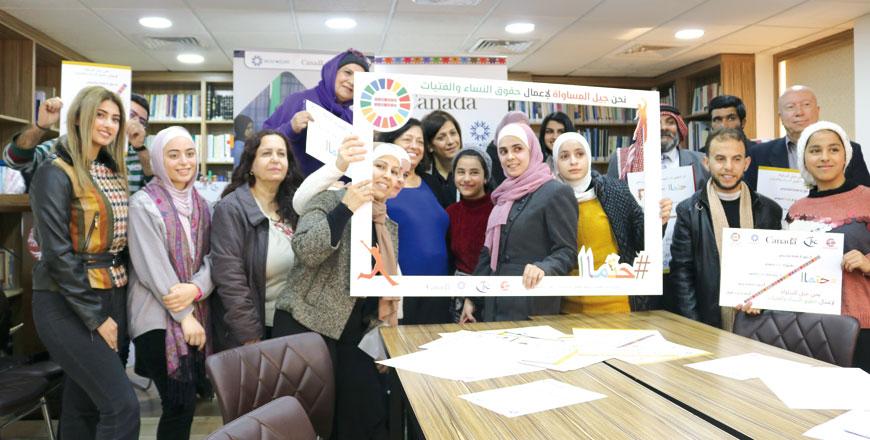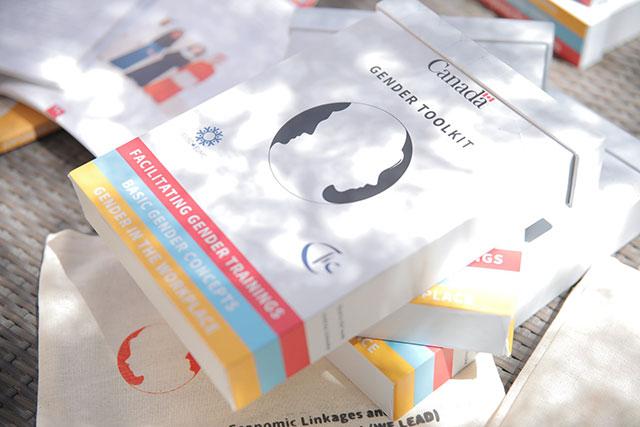You are here
WE LEAD project aims to increase women’s participation in workforce by offering market-driven training programmes
By Batool Ghaith - May 06,2021 - Last updated at May 06,2021

Beneficiaries of the WE LEAD project pose for a group photo (Photo courtesy of WUSC)
AMMAN — The WE LEAD Project provides market-driven gender sensitive accredited training programmes in the health and early childcare development sectors for Jordanian women and female youth across East Amman, Irbid, Salt and Zarqa, through the Vocational Training Corporation, according to World University Service of Canada (WUSC).
Women’s Economic Linkages and Employment Development Project (WE LEAD) is run jointly in consortium between World University Service of Canada (WUSC) and the Canadian Leaders in International Consulting (CLIC) and funded by Global Affairs Canada (GAC), according to a WUSC statement.
WE LEAD aims to increase the number of Jordanian women and female youth in the workforce through accredited market-driven training programmes (Medical Office Assistant, Healthcare Support Worker and the Early Childcare Development), according to Niveen Bataineh, WUSC Country Director.
The project also addresses the underpinning causes of female unemployment such as social norms, safe and reliable public transportation, lack of adequate childcare services, and inclusive work environment, Bataineh said.
“We collaborate with private-sector partners to provide on-site training and, eventually, build job connections based on available opportunities. WE LEAD training programmes have enrolled 476 women and female youth since the project’s inception. By March 2022, the project aims to reach 600 women and female youth,” Bataineh told The Jordan Times.
Bataineh indicated that building the capacities of qualified human resources in the health sector proved to be a national urgency throughout the ongoing COVID pandemic, “accordingly, the WE LEAD Project adapted the learning competencies to match the sector’s need for such qualified professionals,” she continued.
According to Bataineh, the WE LEAD Project promotes women’s economic empowerment through tackling gender specific barriers to women entering and remaining in the work force. Ninety-four per cent targeted women and female youth are now aware of their rights in the workplace, Bataineh said.
“We are working closely with leaders from the private sector partners to promote women leadership practices in order to guarantee the buy-in from the leadership to develop and improve their policies, procedures and practices. Eighty-seven per cent of trained employers and training providers have improved an understanding of a more equitable, inclusive, and safe working conditions until now,” Bataineh said.
In collaboration with Haya Cultural Centre, the WE LEAD Project helped to raise awareness about healthy and secure public transportation with more than 160 children from the project’s target areas. And in collaboration with the Istishari Hospital and the National Centre for Family Affairs (NCFA), the project also launched model daycare facilities at the VTC training centre and Istishari Hospital, Bataineh pointed out.
“As a mother of three daughters, I am participating in this project to help shape a more equal future for women both in Jordan and globally. Current figures show that female unemployment is at 32.8 per cent, while male unemployment at 22.6 per cent in the fourth quarter of 2020, according to the Department of Statistics. This presents challenges in converting potential partnerships and internship linkages into sustainable employment opportunities,” Bataineh said.
According to SIGI, a local women’s organisation, gender inequality has been amplified by COVID-19. Women are expected to be among the hardest hit, since they are often involved in casual and insecure jobs, and are increasingly liable for unpaid activities such as housework and compounded caregiving positions, Bataineh said.
“All of these factors, among others, are being considered in relation to the Theory of Change as we move forward, as further detailed in section,” Bataineh noted.
Azhar Abd Monem, a 24-year-old woman from Irbid, decided to enroll in a Medical Office Assistant (MOA) programme, offered at the VTC centre in Irbid, which got her the first paid position as an administrative assistant for an auditing firm.
“Before I enrolled in the MOA programme, I had been searching for a job for over a year. Even with a diploma in Banking and Finance (BAU) Polytechnic and having completed a three-month internship at a bank, it was difficult to find a suitable position,” she was quoted in the WUSC statement as saying.
Azhar indicated that this position is helping her to achieve her goals by giving her economic independence and opportunities. “With the income I earn, I am saving to pursue further education and to able to support my family with financial responsibilities,” she said.
WUSC Jordan country office was established in Jordan in 2017, partnering with the government of Jordan, national organizations and international development agencies, private sector institutions, and grassroots community based organisations to develop projects to help women and refugees in Jordan, the statement said.
CLIC is a management consulting firm operating in the Middle East and North Africa that provides capacity building and governance expertise, according to the statement.
Related Articles
AMMAN — Jordanian youth on Saturday called for “real” solutions and implementations to laws and legislation to achieve equality and pr
AMMAN — World University Service of Canada (WUSC) and the Canadian Leaders in International Consulting (CLIC) have jointly published a
AMMAN — Director General of the Vocational Training Corporation (VTC) Ahmed Gharaibeh and Deputy Director of International Assistance at Glo













